June 4, 2025 | 03:30 GMT +7
June 4, 2025 | 03:30 GMT +7
Hotline: 0913.378.918
June 4, 2025 | 03:30 GMT +7
Hotline: 0913.378.918
Vinamilk's roadmap to achieving its Net Zero 2050 goal is not only helping the company take well-structured initial steps, but also gradually creating an impact on the entire "ecosystem" by changing the mindset towards green production and sustainable agriculture beyond the boundaries of factories and farms.
During the seminar "Solutions for Applying Circular Economy in the Vietnamese Dairy Industry," Mr. Le Hoang Minh, the Executive Director of Production and Head of the Net Zero Vinamilk project, commenced his presentation by recounting the narrative of Green Farm Tay Ninh. This is a place where the land was allowed to rest for three years to purify, restore nutrients, and return to its most natural state.
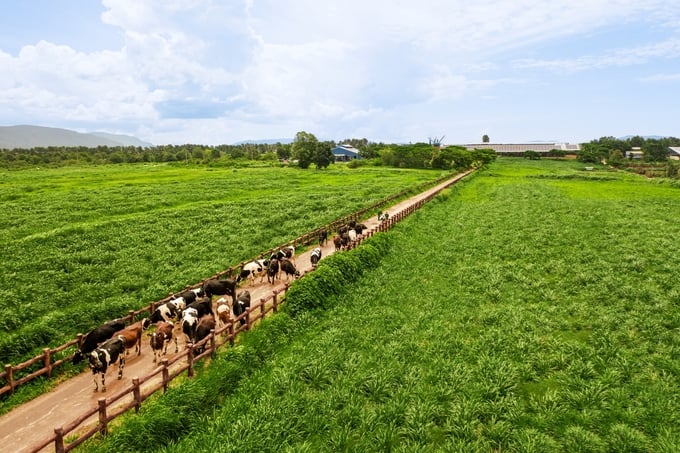
100% of Vinamilk's farming area is cultivated using organic methods and using soil circulation.
The 500-hectare fields now produce two organic European-standard crops of maize and rice annually, thanks to the utilization of waste from 8,000 dairy cows as organic fertilizer, together with crop rotation methods and Japanese technology.
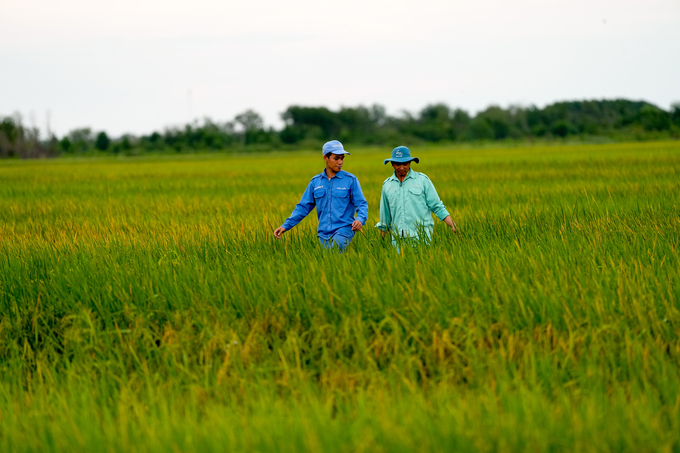
European Organic standard ST25 rice fields - a typical example of the revival of barren lands.
Vinamilk has successfully addressed the challenge of enhancing dairy farming production after nearly two decades of spearheading the "white revolution" through investments in new farm systems and the advancement of dairy farming technologies in tropical areas. At the Vinamilk Green Farm ecological model, which is situated in Thanh Hoa, Quang Ngai, Tay Ninh, the milk output per cow per day has reached the global average of 30-35 liters. Previously deemed unattainable, this amount was thought to be unfeasible due to Vietnam's unsuitable climatic conditions for dairy farming, unlike temperate countries.
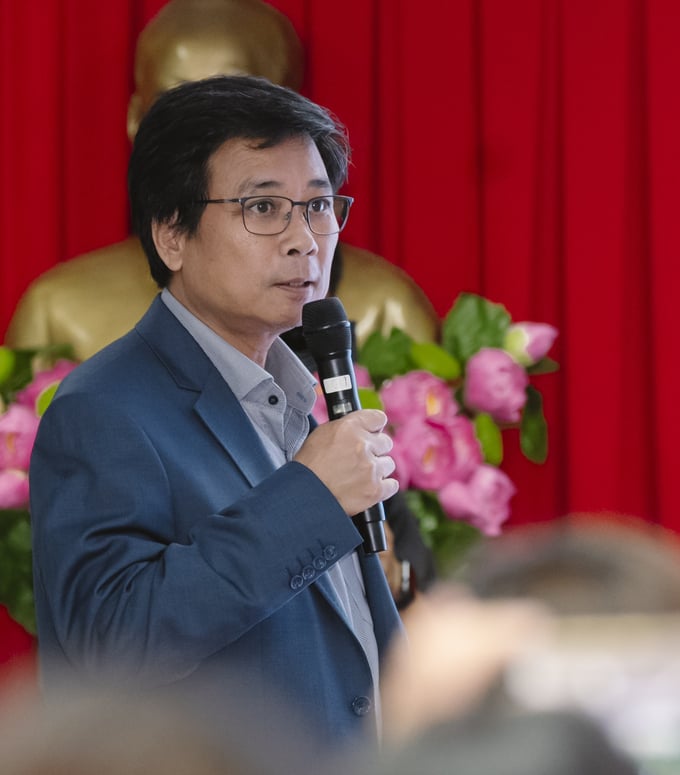
Mr. Le Hoang Minh shared about how Vinamilk applies circular economy to agriculture for sustainable development, aiming for Net Zero.
Mr. Minh states that Vinamilk implements precise efforts to promote sustainable agriculture methods that aim to reduce greenhouse gas emissions. The company places great emphasis on conducting a comprehensive assessment of greenhouse gas emissions. This assessment has been successfully carried out in all of its plants and is currently being implemented in all dairy farms in accordance with ISO14064 standards. The greenhouse gas inventory procedure is complex and essential for determining the strategies and techniques to reduce emissions. This process is particularly demanding due to the extensive system comprising 15 domestic and overseas farms and 16 companies.
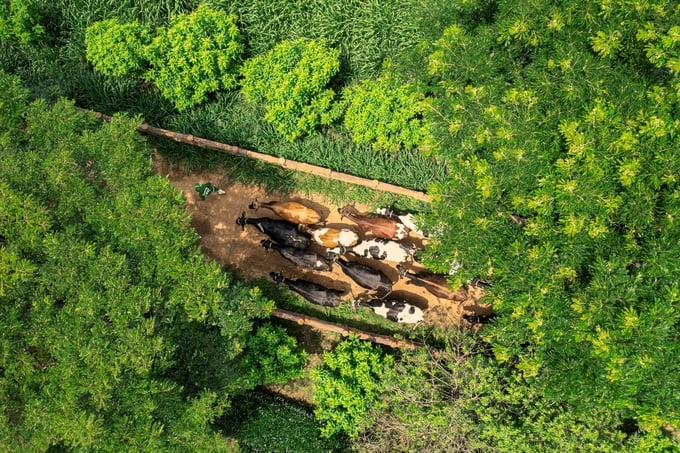
Green Farm's carbon neutrality is equivalent to 30,000 soccer fields covered with trees, and the amount of circulating water is equivalent to 86 Olympic swimming pools.
Significantly, Vinamilk commenced its inventory operations at an early stage. For the past 12 years, data on greenhouse gasses and other relevant information have been consistently collected and arranged into sustainable development reports, adhering to international standards. This practice was implemented even before statutory regulations were introduced.
During the seminar, Mr. Tong Xuan Chinh, Deputy Director of the Department of Livestock Production (MARD), highlighted that sustainable development remains a nascent area in Vietnam and worldwide. Nevertheless, a few Vietnamese companies have shown the courage to take the lead and have attained notable accomplishments. Vinamilk's innovative greenhouse gas inventory will serve as a reference to aid in the formulation of norms and regulations for the future domestic carbon credit market.
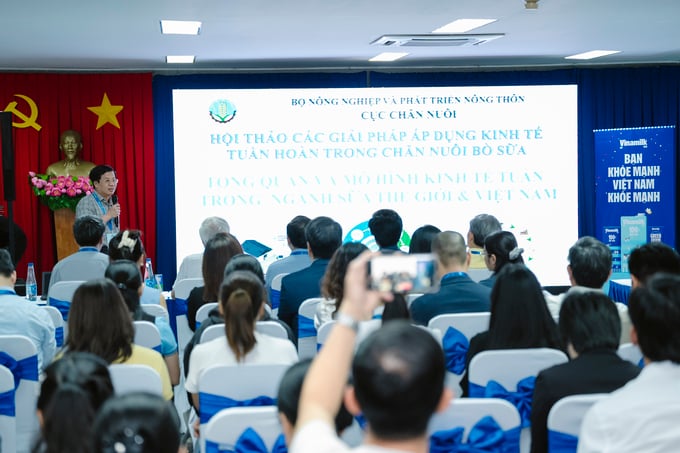
Mr. Tong Xuan Chinh shared at the Workshop "Solutions to apply circular economy in Vietnam's dairy industry".
From a wider viewpoint, not only do businesses gain advantages, but Vinamilk's strategy to achieve Net Zero 2050 has been and continues to foster a comprehensive ecosystem centered around this "giant." Vinamilk plays a vital role in transforming farmers' understanding of farming and providing support to partner businesses in order to achieve sustainable development.
The Chairman of the Vietnam Dairy Association, Mr. Tran Quang Trung, mentioned that in the past, when arriving in Moc Chau town (Son La province), one could immediately detect the odor of cow excrement in the air. Over a period of three consecutive months, a group of leaders, specialists, and engineers from Vinamilk and Moc Chau Milk conducted research and implemented technological solutions to address the treatment of cow excrement and the associated odors. This technology has been effectively applied at numerous farms owned by Vinamilk and has also been introduced to associated dairy farming households for first deployment.
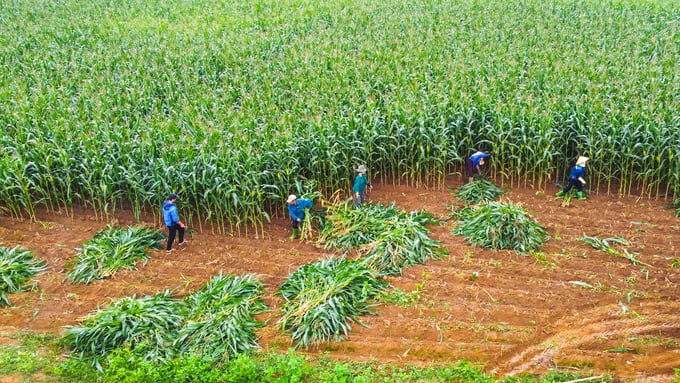
Around the Vinamilk farm, many billion-dollar corn fields of farmers have appeared.
Vinamilk demonstrates its commitment to promoting a sustainable production chain by dedicating a portion of its organic fertilizer supplies to assist neighboring farmers in enhancing soil quality and boosting crop productivity. These crops are subsequently returned to the farm to be used as feed for the cows. This is a self-contained cycle that actively contributes to the reduction of emissions.
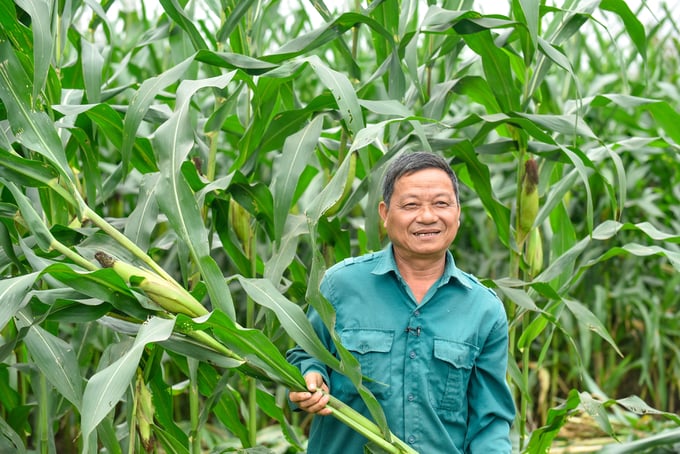
The total output of biomass corn purchased from Vinamilk's affiliated farmers across the country is more than 215,000 tons/year.
Previously, in infertile regions or places where it was difficult for people to cultivate successful crops and raise cattle, farmers are now securely affiliated with Vinamilk's farm. In Thong Nhat, Thanh Hoa, a multitude of high-value fields have emerged on formerly unproductive and deserted farmland.
Crucially, Vinamilk's circular economy model has effectively transformed the production attitude of the people. They have acquired the ability to utilize natural resources, like as land and water, in a more effective and sustainable manner. This involves abstaining from the use of artificial fertilizers and pesticides to guarantee that the farm's production adheres to long-term supply criteria.
Undoubtedly, the "sustainable" agricultural technique has transcended the confines of the farm and disseminated to the neighboring population. Through strict adherence to principles and promises to reducing emissions, the business has successfully raised awareness about this issue in every family within the chain of connection.
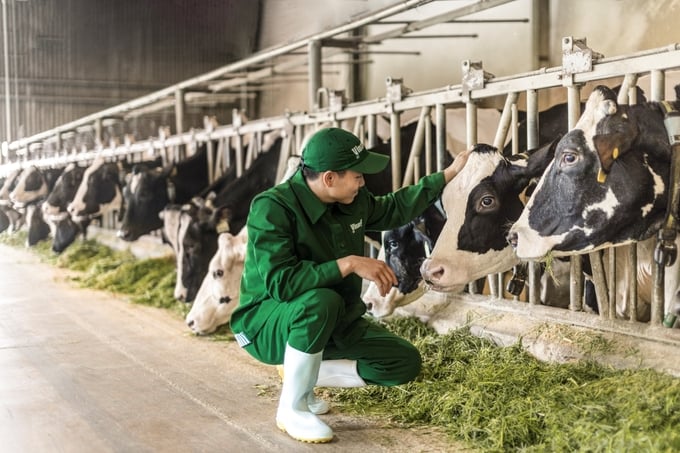
With the orientation of "greening" production, Vinamilk's dairy farms are becoming the nucleus promoting the process of sustainable agricultural practices for the entire land.
The Vietnam Dairy Association is organizing a seminar titled "Solutions for Implementing Circular Economy in Vietnam's Dairy Industry" on World Milk Day (June 1). The main objective of this event is to advocate for sustainable development strategies within the dairy industry. Vinamilk is a leading company in the dairy business that is dedicated to attaining the Net Zero 2050 objective. They aim to decrease greenhouse gas emissions by 15% by 2027 and by 55% by 2035.
Translated by Linh Linh

(VAN) TTC AgriS and IFC signed a strategic partnership to develop a sustainable agricultural value chain, aiming to achieve the Net Zero target by 2035.

(VAN) Seafood by-products are opening a new path, combining green growth and technological innovation to enhance the industry's value.

(VAN) Mr. Nguyen Thanh Cong, Vice Chairman of the Son La Provincial People's Committee, reflects on Son La’s journey from barren hills to fruitful orchards after a decade of hard work.

(VAN) FAO’s Director-General addresses the 5th Baghdad International Water Conference.
/2025/05/26/1716-4-nongnghiep-191706.jpg)
(VAN) Chain linkages, technological innovation, and raw material zoning are three strategic pillars for the coconut industry to strongly develop and elevate its position on the global agricultural map.
![Advanced mariculture – an inevitable trend: [4] Accompanied by scientists](https://t.ex-cdn.com/nongnghiepmoitruong.vn/608w/files/sohk/2025/05/13/1941-pgsts-vo-van-nha-140958_717.jpg)
(VAN) According to Assoc. Prof. Dr. Vo Van Nha, Director of the RIA III, the development of advanced offshore mariculture is no longer an option but an essential path for Vietnam’s fisheries sector.

(VAN) Vietnam is intensifying the development of mollusk farming areas that meet international standards, aiming for sustainable growth and enhancing its export position in the global seafood market.